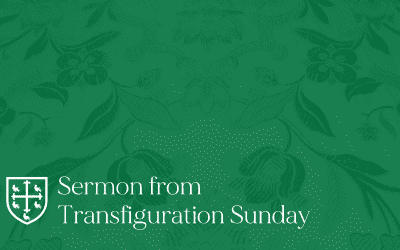4 Lent Year C 3/30/2025
Joshua 5:9-12; Psalm 32; 2 Corinthians 5:16-21; Luke 15:1-3, 11b-32
Rev. Mark A. Lafler
Before I was a priest I served for seven plus years in the retail banking industry.
Early on I was a teller and eventually sat behind a desk helping clients open new accounts and assist with other incidents that might come up.
Well, back in the late 1990’s before everything was so digitalized banks were much busier than they are now.
And I remember a few clients that would come in monthly or quarterly to have their checkbook reconciled with the bank records.
This one older lady, who always dressed to the hilt, came monthly and had her checkbook looked at.
We would go through it…
Compare her register to the bank records…
And it seemed so often we would be off by just 5 cents or even one penny.
But that wasn’t good enough.
It had to be perfect!
So, on we would go, looking for that accounting error…
15 minutes turned to 30 minutes sometimes turning into 45 minutes…
The temptation to just add a penny or a nickel to make it reconcile was a real temptation.
Eventually we found it.
All was good…
Until the next month.
Those were the days!
It wasn’t my favorite thing to do…
But reconciling bank statements was important.
And that’s our word for today…
Reconcile or reconciliation.
The English word derives from the Latin.
The root word is conciliāre which means to assemble, unite, win over…
When you add the prefix “re” meaning “again” or “back”.
You get the idea of “to bring together again” or “to make good again” “to make friendly again” “to repair”
We often hear the word reconciliation regarding relationships.
Perhaps a married couple is working on reconciliation…
or members of an estranged family are working out their differences through reconciliation.
We hear the word a lot regarding racial tensions…
especially here in the United States.
We still face the aftermath of the sins of our country regarding racial slavery and the Jim Crow Laws of the south.
The church and other organizations work to bring reconciliation among racial, ethnic, and cultural differences.
Which is still very much needed in our country, state, and community.
Reconciliation is also a key word of the Bible.
And our second reading from 2 Corinthians is a key text on the theology of reconciliation.
It is helpful way to describe God’s mission in the world…
As well as God’s relationship with His church…
His people.
It is God’s desire that all people would be reconciled to himself.
The good news for every believer in Jesus Christ is this…
As we read in our text:
If anyone is in Christ, there is a new creation:
everything old has passed away;
see, everything has become new!
All this is from God…
It is from God…
This newness of life is not something we produce or deserve…
God has done this amazing work in us.
We are being made new, we are new, and we will be renewed.
We are part of God’s new heavens and new earth…
A renewed creation!
How has this happened?
Our text says:
God… reconciled us to himself through Christ
God has reconciled us…
He has restored our relationship with him through Jesus Christ.
That is in the person and work of Jesus, God-Incarnate.
In the atoning work of the cross…
Jesus took on our sin…
So that we could be reconciled to God.
Made right with God.
This is the great exchange…
The great reconciliation.
In fact, that’s what the Greek word (katallassw) translated as reconcile suggests: exchange.
While we were sinners…
Even enemies…
We were estranged from God…
He died for us.
God in Jesus Christ exchanged himself for us.
This is what happens by faith in our baptism.
We become reconciled to God.
Justified by faith through the grace of God.
So that we can be in a restored relationship with God.
And not only are we reconciled to God by His grace…
We also walk daily in being reconciled to God.
We are reconciled and we are also being reconciled.
Theologically this is called sanctification…
Being made holy,
Being set apart for God from the world…
each day…
each moment…
We are being reconciled to God…
By the power of the Holy Spirit.
Our reading says:
…we entreat you on behalf of Christ, be reconciled to God.
For our sake he made him to be sin who knew no sin,
so that in him we might become the righteousness of God.
So, we are reconciled by faith in Christ Jesus.
We are also walking out this reconciliation in this world.
And the ultimate consummation of this reconciliation is when Christ returns to set the world at rights.
To make all things new.
Which is our hope in this world.
And because of this reconciliation in our life…
Because of this dynamic work of God…
We are to bring reconciliation to the world…
Three times St. Paul writes:
- God has given us the ministry of reconciliation
- …entrusting the message of reconciliation to us
- So we are ambassadors for Christ, since God is making his appeal through us…
As God’s ambassadors we bring the message of reconciliation to our neighbors, our family, our communities, and beyond…
Wherever we go.
We bring this reconciliation through the message of the gospel
Which the last verse gives this very message…
It’s a summary of the Gospel.
For our sake he made him to be sin who knew no sin,
so that in him we might become the righteousness of God.
Jesus Christ the righteous took on the sin of the unrighteous so that we could be reconciled with God.
He became like us so that we might become like him.
St. Athanasius said it this way:
He became like us so that we might become like him
Our collect for today hints at this same message…
Listen to the prayer:
Gracious Father,
whose blessed Son Jesus Christ came down from heaven to be the true bread which gives life to the world:
Evermore give us this bread,
that he may live in us,
and we in him…
And so we are called to share this good news of Jesus in the world.
And the amazing thing in all of this is that God uses the ordinary in this world to do the extraordinary.
He chooses ordinary folks…
You and me and you…
To share this news in the world.
God loves to use the ordinary to do the extraordinary.
You can see this in the sacraments:
In baptism God uses normal water to do a work of grace in the heart and mind of the person being baptized.
We use tap water…
The same tap you have in your house.
It’s not from a special spring or river that we import.
It’s just water.
Normal water for extraordinary purposes.
In communion we use normal bread and normal wine.
Sure, we order it from a supplier for pragmatic reasons…
But we could just as much pick up our wine at the local wine shop and the bread from the grocer or the local bakery.
The ordinary for the extraordinary.
And the same goes with us…
God uses us… normal people… to be set apart for the extraordinary.
To bring the ministry of reconciliation in this world.
He chose us to bring this message to a world that needs it so much.
So, as we consider all the things that need to be restored in our world.
The brokenness of people…
The disconnect in our world…
The tensions between families, communities,
and people of different races and cultures…
The social inequalities…
The lack of care and compassion for others…
The pain and unforgiveness that brings bitterness and sorrow.
The world is in deep need of the good news of Jesus.
May we remember our lesson today…
The promise of God that he has reconciled us to himself.
And the call of God…
To be ambassadors in this world in the ministry of reconciliation.
To share the good news of Jesus.
Thanks be to God who makes us righteous because of the ministry of Jesus Christ…
May we share that good news in this world.
Amen.




